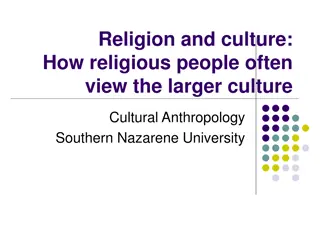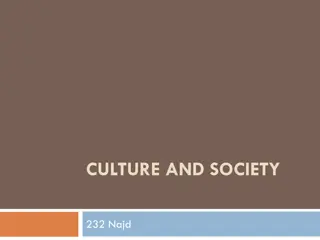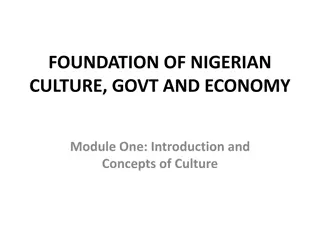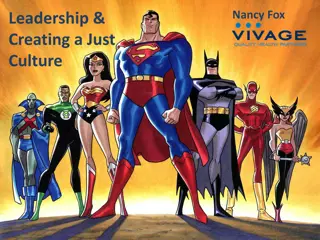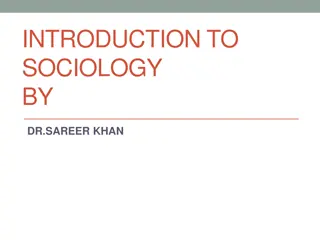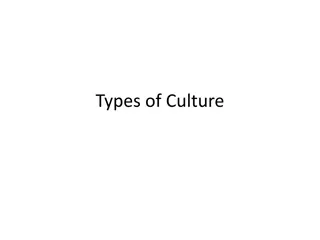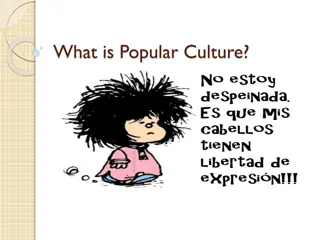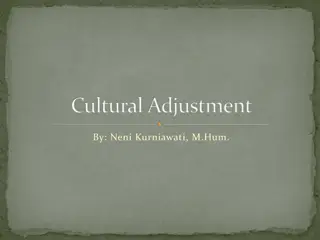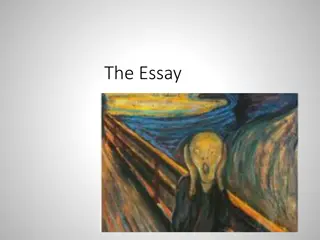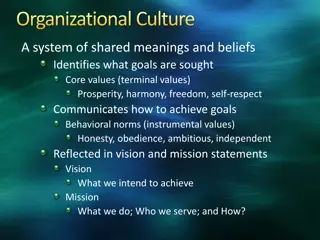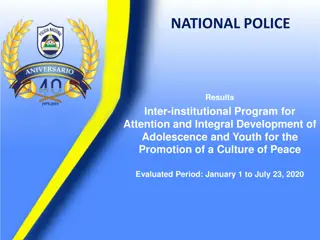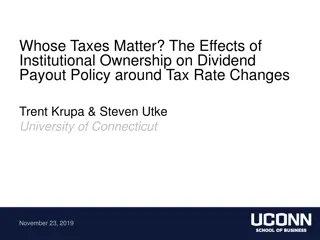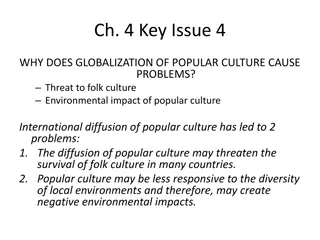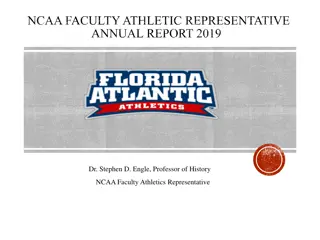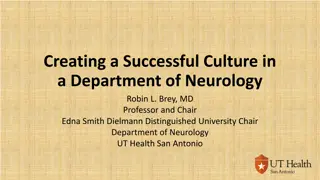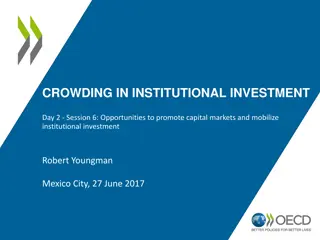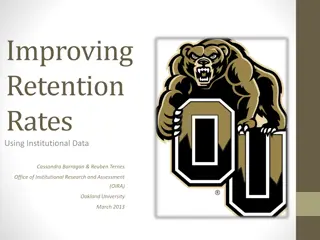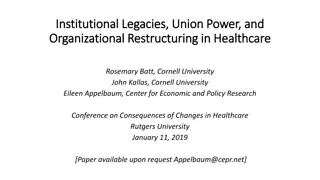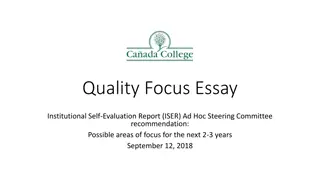INSTITUTIONAL GOVERNANCE FRAMEWORK
Currently, there is a lack of formal structure in the Institutional Housing Governance Framework (IHGF) within the public service system, leading to inefficiencies in managing institutional housing policies. This absence has resulted in deteriorating state assets, unmet housing demands, and ineffect
0 views • 17 slides
Perspectives on the Relationship Between Religion and Culture
Religious people often perceive the larger culture in different ways, as illustrated by Richard Niebuhr's classic positions in "Christ and Culture" and Charles Kraft's later perspectives on God's role in culture. These viewpoints range from rejecting cultural influence to integrating Christianity an
1 views • 14 slides
Understanding Culture and Society
Culture and society are interconnected concepts, where culture encompasses beliefs, behaviors, and objects shared within a community, shaping their identity and values. Society, on the other hand, comprises individuals interacting based on common cultural bonds, whether ethnic, gender-based, or thro
0 views • 12 slides
Understanding Nigerian Culture, Government, and Economy: Module One
Delve into Module One of the course on Nigerian culture, government, and economy with a focus on the Introduction and Concepts of Culture. Explore definitions of culture, various types of culture, characteristics, importance, related concepts, levels, and differences between culture and ethnic group
1 views • 31 slides
Understanding Just Culture in Leadership: Creating a Fair and Error-Preventive Environment
Punitive culture in institutions can lead to mistakes being hidden, affecting error prevention. Dr. Lucian Leape highlights the importance of avoiding punishment for errors, advocating for a Just Culture model. This model, coined by David Marx, recognizes human error and helps differentiate between
0 views • 24 slides
Understanding Plant Tissue Culture: Methods and Requirements
Plant tissue culture involves the in-vitro culture of plant explants under aseptic conditions, covering cell, organ, and suspension cultures. This process, pioneered by German botanist Gottlieb Haberlandt, relies on the totipotency of plant cells. Key requirements include laboratory organization, su
0 views • 18 slides
Leading to Safety
Examining the crucial link between organizational culture and safety programs, this content emphasizes the importance of fostering a culture of safety within organizations to ensure the success of safety initiatives. It explores the process of changing organizational culture, starting from defining
0 views • 20 slides
Understanding Culture in Sociology: Key Concepts and Definitions
Culture is the cornerstone of society, distinguishing humans from animals and shaping our social lives. Sociologists define culture as the shared values, practices, norms, and beliefs that govern our interactions and behaviors. This comprehensive guide explores the non-material aspects of culture, i
1 views • 30 slides
Understanding Plant Tissue Culture Media and Their Importance in In Vitro Growth
Plant tissue culture media play a crucial role in the in vitro growth and morphogenesis of plant tissues. The composition of culture media depends on the specific plant species and the type of material used for culture. Various types of media, such as White's medium, MS medium, B5 medium, N6 medium,
0 views • 6 slides
Overview of Cell Culture Methods and Importance in Research
Introduction to the principles of cell culture, including tissue culture, organ culture, and cell culture methods. Discusses the advantages and disadvantages of each technique and highlights the need for cell culture in research for studying cellular behavior and large-scale production of cell mater
3 views • 45 slides
Understanding Popular Culture: Classification and Impact
General classification of culture includes Popular, High/Elite, Low/Subculture, Primary & Secondary, Folk, and Co-Culture. Popular culture, shaped by mass media, encompasses ideas, attitudes, and phenomena favored by society. It influences daily life, with examples like styles of dress, slang, and s
0 views • 16 slides
Approaches to Study Comparative Politics: Traditional vs. Modern Perspectives
This chapter discusses the importance of approaches in the study of comparative politics, categorizing them into traditional and modern perspectives. Traditional approaches include philosophical, historical, and traditional institutional approaches, highlighting their strengths and limitations. Mode
0 views • 7 slides
Understanding the Institutional Culture of South African Universities from a Student's Perspective
Exploring the production of institutional culture in South African universities and the challenges faced by students, particularly in terms of access, equity, poverty, and academic support. Collaboration among university stakeholders is crucial for addressing social justice issues and ensuring stude
3 views • 11 slides
Perspectives on Youth Culture Through Functionalist and Neo-Marxist Views
Functionalist and Neo-Marxist perspectives on youth culture offer contrasting views on its purpose in society. Functionalist theorists emphasize the role of youth culture in providing a transitional phase for young people, aiding in their social integration and development of independence. On the ot
0 views • 11 slides
Maximizing Institutional Impact through ACE Centers of Excellence
ACE Impact Centers of Excellence benefit from strong institutional support and are crucial for catalyzing broader teaching and research excellence. The DLI.7 framework outlines various elements that support global best practices in Higher Education, emphasizing the importance of institutional owners
0 views • 17 slides
Understanding Popular Culture and Ideology
Popular culture encompasses the lived practices and artistic products of society, contrasting with high culture. Various definitions highlight its appeal to a wide audience and its distinction from high culture. The relationship between popular culture and ideology is explored through practices that
0 views • 15 slides
Understanding Cultural Adjustment: Navigating Different Ways of Life
Cultural adjustment involves experiencing culture shock when encountering a new way of life due to immigration, travel, or a shift in social environments. This process includes symptoms like excessive concern, fear of physical contact, and refusal to learn the host country's language. Overcoming cul
0 views • 12 slides
Understanding Culture Shock: Phases, Symptoms, and Coping Strategies
Culture shock is the anxiety and disorientation experienced when adapting to a new and unfamiliar culture. This phenomenon involves various stages, from the honeymoon phase to readjustment and reverse culture shock. Symptoms of culture shock can be physiologically, psychologically, and socially base
1 views • 11 slides
Proposed NRC Safety Culture Policy Statement Overview
This document provides an overview of the proposed Nuclear Regulatory Commission (NRC) Safety Culture Policy Statement presented by Eric Fries, the Safety Culture Program Manager. It covers topics such as NRC's mission, responsibility, safety culture background, draft policy statement, current statu
0 views • 24 slides
Exploring Civic Virtue and Institutional Design in Early Modern Governance
Delve into the complexities of civic virtue and institutional design in early modern governance through a 3,000-word essay. Analyze the necessity of civic virtue within the state and consider contrasting perspectives on whether institutional design can replace it. Use primary texts to support your a
0 views • 32 slides
Plant Tissue Culture Methods for Growth and Reproduction Study
Plant tissue culture methods such as root tip culture, shoot-tip culture, leaf culture, flower culture, and anther and pollen culture allow for the study of growth, reproduction, and genetic variations in plants. These techniques involve culturing various plant parts under sterile conditions to inve
1 views • 20 slides
Impact of UN Guidelines on Foster Care and Institutional Care of Young Children in Europe and Central Asia
Professor Kevin Browne and Dr. Shihning Chou conducted a study on the impact of UN guidelines on foster care and institutional care of young children in Europe and Central Asia. The research highlights the physical harm and neural damage caused to children in institutional care without a parent. It
0 views • 11 slides
Strengthening Legal and Institutional Frameworks for REDD+ in Republic of Congo
The Ministry of Forest Economics in the Republic of Congo, along with the National REDD Coordination, is actively identifying, evaluating, and strengthening the legal and institutional frameworks for the REDD+ process. Progress reports highlight the establishment of institutional arrangements, imple
0 views • 10 slides
Institutional Assessment & Research at Wentworth Institute of Technology
Wentworth Institute of Technology excels in accreditation, institutional assessment, and research. The institution's leadership program oversees accreditation efforts to ensure educational effectiveness. They focus on assessing student learning outcomes, measuring educational effectiveness, and cond
0 views • 5 slides
Understanding Organizational Culture and Its Impact on Business Success
Organizational culture encompasses shared beliefs, values, and behaviors within a company. It influences goal-setting, strategies, and employee actions. The transmission of culture is vital for aligning values with business practices. Culture matters for client relations, differentiation, and managi
0 views • 17 slides
Institutional Assessment and Effectiveness Workshop Achievements at SUNY Oneonta
The Office of Institutional Assessment and Effectiveness at SUNY Oneonta has made significant progress in developing assessment protocols and processes, leading to a culture of assessment. This includes completing planning and assessment cycles, establishing objectives and procedures, and aligning u
1 views • 16 slides
Understanding Corporate Culture vs. Safety Culture in Organizations
Explore the dynamics of corporate culture and safety culture within organizations through a series of images and quotes. Learn about aligning goals, promoting a culture of safety, and the crucial factors that contribute to a safe workplace environment. Delve into the responsibilities of management,
0 views • 38 slides
Inter-institutional Program for Youth Development and Peace Promotion
The National Police's Inter-institutional Program focuses on adolescent and youth development for a culture of peace. Various government institutions collaborate to implement the program, offering social care, promoting youth culture, entrepreneurship, and community-police relations. Over the evalua
0 views • 14 slides
Utilizing Institutional Data to Enhance University Policy: Insights from Oakland University Research
Extracting valuable insights from institutional data, the Office of Institutional Research and Assessment at Oakland University conducts various research activities to improve university policy. Through surveys and internal research, they address important questions like student workload, financial
0 views • 18 slides
Institutional Effectiveness and Assessment at B-CU
Jennifer Dash, Director of Institutional Assessment, and Dorian Hooks, Institutional Assessment Coordinator at B-CU, lead the efforts in understanding institutional effectiveness and assessment. Capacity building, creating a common vision, and a framework for institutional effectiveness are highligh
0 views • 35 slides
Certificate Courses in Indian Cultural Studies by Department of Vedic Sciences & Indian Culture
Explore month-long certificate courses in Indian Cultural Studies offered by the Department of Vedic Sciences & Indian Culture in collaboration with Sri Aurobindo Foundation for Indian Culture. Delve into India's rich cultural heritage to gain insights into ancient wisdom traditions, prepare for con
0 views • 8 slides
Effects of Institutional Ownership on Dividend Payout Policy
This study examines how a firm's ownership structure, particularly institutional ownership, influences its dividend policy around tax rate changes. It explores the impact of tax-sensitive/insensitive institutional ownership, the role of dedicated institutions as monitors, and the interaction between
1 views • 26 slides
Challenges of Globalization in Popular Culture
Globalization of popular culture presents challenges such as the threat to folk culture and negative environmental impacts. Rising incomes lead to a shift from folk to popular culture, affecting traditional values and clothing symbolism. The adoption of Western clothing in Middle Eastern countries f
0 views • 12 slides
NCAA Faculty Athletics Representative Annual Report 2019
Dr. Stephen D. Engle, a Professor of History, serves as the NCAA Faculty Athletics Representative (FAR) and Chair of the Inter-Collegiate Athletic Committee. The report outlines the general responsibilities of the FAR, including overseeing sub-committees on Academic Performance, Institutional Contro
1 views • 13 slides
Cultivating a Successful Culture in Neurology Department
Importance of culture in a neurology department highlighted by Dr. Robin L. Brey. Emphasis on how culture trumps strategy and the role of leaders in maintaining a positive culture. Examples and insights on how culture influences decision-making and behavior. Attributes of a successful culture and ho
0 views • 21 slides
Role and Functions of Institutional Research in Higher Education
This content discusses the importance of developing duties and functions for Institutional Research (IR) professionals in higher education institutions. It highlights the key responsibilities of IR, such as identifying information needs, collecting and analyzing data, serving as data stewards, and e
0 views • 21 slides
Opportunities to Mobilize Institutional Investment in Capital Markets
Aligning trillions of dollars managed by OECD institutional investors towards green infrastructure investments presents a significant opportunity. Currently, only a small percentage of large pension fund assets are directed towards infrastructure, with an even smaller fraction allocated to green pro
0 views • 4 slides
Enhancing Student Retention Rates through Institutional Data Analysis
Explore how Oakland University's Office of Institutional Research and Assessment leverages various data sources, policy analysis, and predictive modeling to improve student success and retention. Discover the role of IR offices, available resources, survey data, and the importance of collaboration f
0 views • 33 slides
Examining Union Power and Institutional Legacies in Healthcare Organizational Restructuring
Challenges faced by healthcare unions due to institutional legacies and shifts in the healthcare system are explored. The study delves into the variation in union success, emphasizing local institutional contexts in the U.S. and power dynamics between employers and unions rooted in historical contin
0 views • 16 slides
Institutional Self-Evaluation Report: Quality Focus Areas for Future Growth
The Institutional Self-Evaluation Report recommends key focus areas for the next 2-3 years to enhance student learning and achievement. Projects include addressing barriers to entry, streamlining processes, enhancing student support programs, and improving institutional effectiveness through plannin
0 views • 5 slides

